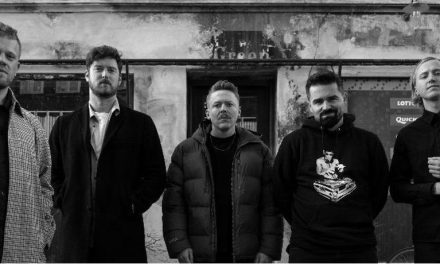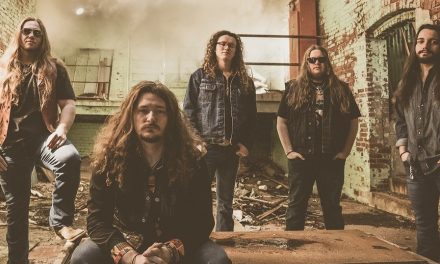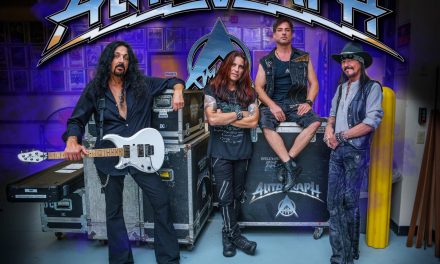
Putting Southampton on the Map: An Interview With Burning House
Putting Southampton on the Map: An Interview With Burning House
For a music fan that enjoys heavy guitars ala Swervedriver, Sonic Youth, Smashing Pumpkins and My Bloody Valentine, Southampton, England’s Burning House surpasses those influences to make something fresh, exciting and quite noisy. The trio recently released the Tracer EP on Bandcamp and to help spread the word, I spoke with lead arsonist Aaron Mills.
Listening to the first song Ripened, on your Tracer EP, there’s many layers of effected guitars, yet you’re a trio. How do you manage that guitar sound and sing live? Do you chart out or time and practice all your pedals and effects?
This is a very good question and very perceptive of you. Yes, it can be a challenge. Originally we had another guitarist but he left so I went to work trying to solve the remaining equation.
The simple answer is I use a lot of pedals, effect combinations et al. to enhance, exaggerate and assimilate the sound you hear in the recordings in a live context. Doing this as well as singing is difficult though, so we are currently on the lookout for another guitarist who I can delegate at least some of the responsibility to.
What guitar(s) do you play and what are some of the most-used pedals?
Currently my main guitar is a Japanese Fender Jazzmaster, this provides all the unadulterated shoegaze by way of a taped-up Tremolo arm and various fucked up tunings. I also use a custom made Aluminium guitar from The Electrical Guitar Company, a business that has expanded considerably now, designing guitars for the Melvins and Dave Grohl. It was my erstwhile infatuation with anything Steve Albini-related that drove me to buy it. Also been known to play a Fender Stratocaster with lace-sensor pickups that once belonged to my father.
Pedal wise, I try not to be too precious ha!, but I use overdrives, EQs, Strymon Big Sky and any nasty distortion pedal I can get my hands on. But it’s more of a question of the contrasts which feed each other, creating a strange dance.

The need for intensity and almost bipolar shifts in mood and dynamics is characteristic of my writing. I suppose it’s the need for personal autonomy manifesting itself in my music– the sublimation of desires and behaviours. In the case of Mercurial, I’m trying to saturate, overwhelm and drive you to the edge of a cliff. To explain further, the impression of “loudness” and depth, is only as strong as the structures that surround them and these are often paradoxical or antithetical, this is what I learned from classical music and writer Alan Watts: that constant fight between dark and light. This is the best way I can explain it. It’s almost neurological, setting off as many fireworks in the brain as possible. To get dangerously scientific, In this sense it is confrontational, as the brain’s limbic system will want to fight anything that it perceives as a threat– the more you introduce from left-field, especially culturally, the greater the perceived threat. This philosophic reasoning is evidenced by the band name itself: burning house as the desire to destroy and rebuild, and each time this event takes place, hopefully a stronger, more sustainable edifice is left standing.
I Am A Tree caught me by surprise, starting out one way than a guitar lick leading to a new mood then that caustic guitar squeal. Was there a band or song or person in your life that inspired your willingness to take risks and try different things and take risks?
Well, this was the first properly recorded burning house tune. I was given a weekend by producer and friend Ben Startup, to record something for free, as we were going to submit to a Fire Records Guided By Voices compilation. I was given free-rein. After the drums were laid down, I just started building and building on it. The only difficult thing was the vocal, I wasn’t sure how I was going to do it. I’d just gotten over a nasty bout of flu. But I got a little stoned and found what I was looking for eventually. I think it’s important to experiment to the utmost, this is the best defense against mediocrity. When the clock is ticking, however, it becomes an expensive process, but you find ways through it. Much like countries in battle devise ways of overcoming geographic obstacles… this is all dependent on technology.
Vague just washes over me with its seemingly slow yet epic feel. What has creating music done for you?
This was for me, the most perfectly realised piece on the whole EP. With it’s expanding/contracting structure, which has no chorus, just gradually evolving sequences that rely on the listener’s memory. Recollection. This demonstrated to me that I didn’t have be beholden to any traditional structure. As much as I admire songwriters from Mark Kozelek, Elliott Smith through to Leonard Cohen, I am equally moved by Glenn Branca‘s guitar orchestras, the later work of Swans and Scott Walker, and the classical music of Ligeti and Giancinto Scelsi. Within the context of songwriting, however, I see one needs compositional ‘permission’ to gravitate to those areas, that is to say, melody remains at the top of the pyramid if you like, of the song.
What bands and musicians have you enjoyed and how have they affected your life?
The first group that I really got into was Blur, and the cosmopolitan nature of the music no doubt had an impact on me, the embers are alit somewhere in me still. However, the beginning of the sonic journey of the guitar began with Smashing Pumpkins‘ Siamese Dream, this record took me to places emotionally, viscerally that I had never experienced before. It was through that I discovered Loveless and the guitar began to symbolize something more… something that wasn’t constrained to ‘genre’. I started to see it as a sonic palette from which to draw different colours and hues etc. In my teens I was big into anything that Warp Records put out and I even abandoned guitar for a year or so in favour of the sampler. I really liked how you could examine sound, decode it almost. We all listen to a wide spectrum of music, Sam is into the technicality of Prog, anything that Steven Wilson touches. Patrick is one of the biggest Guided by voices fans you’re ever likely to meet. Other acts we like include: The Brian Johnstown Massacre, Red House Painters, The noir-stylings of Blue Nile, and recently the punk anarchism of Shitkid.

Do they have to be recent? Alive? Dead? There’s so many I could name. Of the current crop, I really think we would gel with A Place To Bury Strangers who are as confrontational as we aim to be. Steve Reich performing 18 Musicians would be a suitable comedown to our apocalyptic sound!
Have you toured and where to? Where was the best show?
We have yet to tour, but this is on the cards, generating a number of fans in the States so we’re beginning to save. We have played with some amazing groups though, notable ones include: Moon Duo, Shonen Knife, Kagoule, The Chills and Wire.
What is the feedback from music fans like? How has your music been received?
It’s been great. We have won some devoted fans from all over the world, including BBC6 music’s Steve Lamacq. We have received many flattering remarks from people who have proclaimed us their new favourite band. One of the finest plaudits though, is interacting with photographers, musicians and painters in whom you find a mutual appreciation. That keeps you going and makes you feel as though you’re doing something right. Irrespective of this however, we plan to excel at our craft and take no prisoners.
What happened to the Anthropocene album? Are the five songs you’ve released so far part of the album? Will we eventually see a full length?
That is coming, as well as another EP, both before the end of the year. Can’t reveal too much. You’ll just have to wait and see.
Please tell us about your fellow members and what they bring to the Burning House sound and what is the funniest thing about each of you?
Patrick White, Bass, is an introvert, but with utter conviction in what he wants and high aesthetic values. I can always rely on him for commitment in seeing a creative project to its absolute.
Our current drummer Sam Garnett, is one of the best I’ve ever played with, so quick off the mark, extremely natural, and more logical than any of us! This makes for an inspiring synergy, whereas I, in the context of creative activity anyway, am a predominately right-brained thinker/dreamer.
I‘m an armchair traveler, so tell me about Southampton. What is the city primarily known for? What is a local beer, local food, local monument/historical spot?
A quote that I remember hearing about Southampton “Southampton is an unskilled, transient and ageing population” We would have had a beautiful medieval wall, had the Germans not bombed the shit out of it. It is overshadowed by the beautiful architecture of nearby Winchester, which escaped war-time desecration. So, thank god for The Hobbit, and Shooting Star, both drinking haunts where good people can mingle. Where infrastructure lets you down, alcohol is as ever the provincial saviour!
Is there much of a music scene there? What are the venues and shows like? You’re close to the Isle of Wight, have you been to the festival there? If so, who were some of your favourite bands that played?
Some good bands have emerged from the area: friends such as Dead Rabbits, Co-Pilgim and KVB all have their roots here. This has rescued the city from being a cultural wasteland. The Joiners is a great venue, solid sound and pretty legendary, Radiohead, Oasis and (almost) Jeff Buckley played there.
What is Burning House doing to put Southampton on the map as a source of great bands like yours and Superdrone?
We want to go all the way. This is not a band of dilettantes, there is no excuse to be creatively complacent. I hope that other bands and other artists emerge that extinguish the musically conservative trend of the so-called scene. There is something abhorrent about competition, but at the same time, it can drive great innovation. My only gripe is homogeneity; of bands and artists competing to be the best “same”. That really needs to go. As a nascent stage and a way to gain “acceptance”, it’s understandable you’d want to slot into a scene, but this, in my estimation, is really a faux power and a dilution of individual will.
Do you have live dates coming up that you can tell people about?
We have a show in Worthing at Bar 42 on June 29th and are currently in the midst of booking a slew of dates all over the country and beyond. So hit us up!
(by Bret Miller)
LINKS:


















